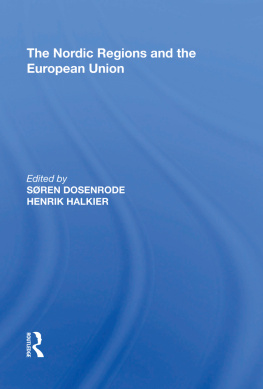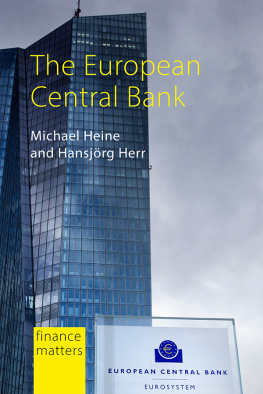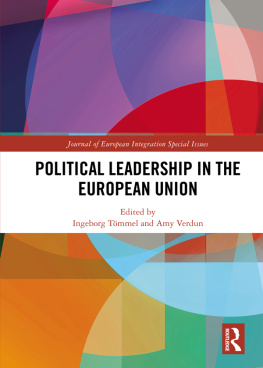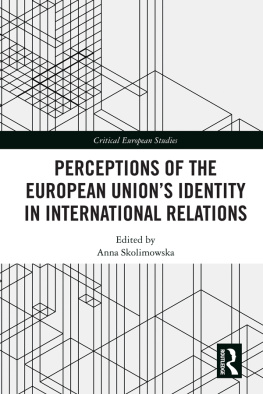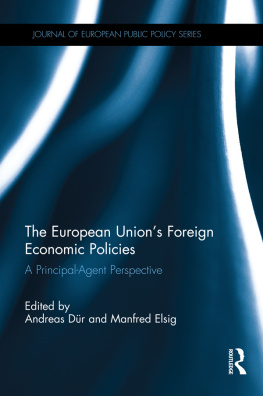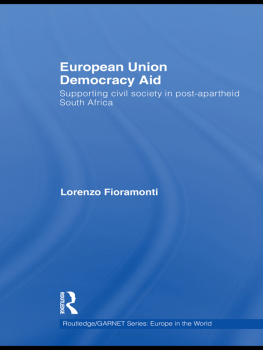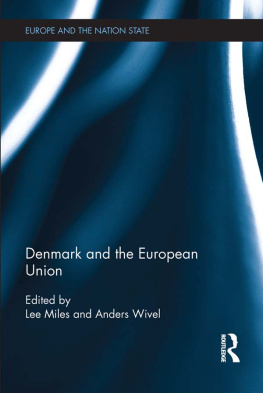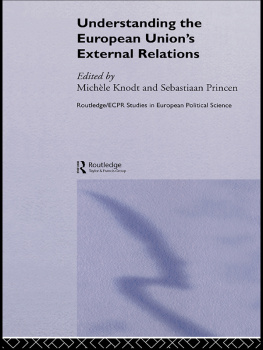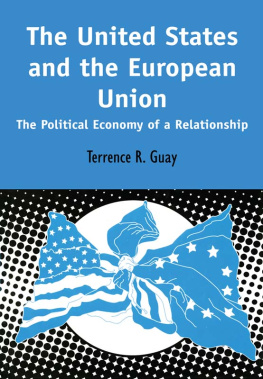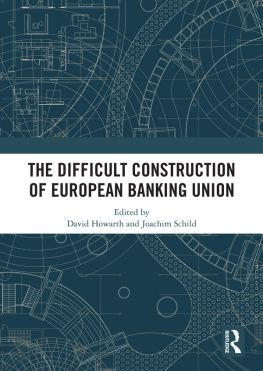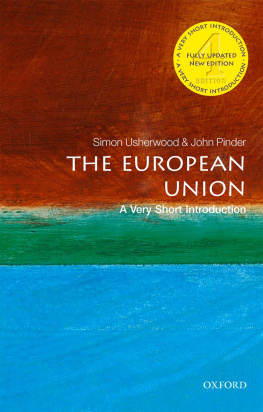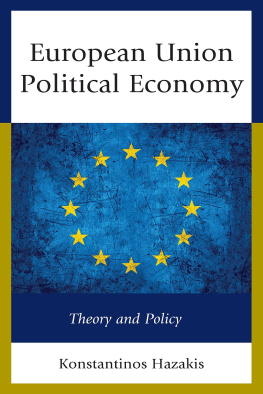
Political Aspects of the Economic and Monetary Union
The International Political Economy of New Regionalisms Series
The International Political Economy of New Regionalisms Series presents innovative analyses of a range of novel regional relations and institutions. Going beyond established, formal, interstate economic organizations, this essential series provides informed interdisciplinary and international research and debate about myriad heterogeneous intermediate level interactions.
Reflective of its cosmopolitan and creative orientation, this series is developed by an international editorial team of established and emerging scholars in both the South and North. It reinforces ongoing networks of analysts in both academia and think-tanks as well as international agencies concerned with micro-, meso- and macro-level regionalisms.
Editorial Board
Timothy M. Shaw, University of London, London
Isidro Morales, Universidad de las Amricas - Puebla, Mexico
Maria Nzomo, University of Nairobi, Kenya
Nicola Phillips, University of Warwick, UK
Johan Saravanamuttu, Munk Centre for International Studies, Canada
Fredrik Sderbaum, Gteborgs Universitet, Sweden
Other Titles in the Series
South Africa's Multilateral Diplomacy and Global Change
Edited by Philip Nel, Ian Taylor and Janis van der Westhuizen
European Union and New Regionalism
Edited by Mario Tel
Crises of Governance in Asia and Africa
Edited by Sandra J. Maclean, Fahimul Quadir and Timothy M. Shaw
The Politics of Economic Regionalism
David J. Francis
Reconstituting Sovereignty
Rory Keane
Political Aspects of the Economic and Monetary Union
The European challenge
Edited by
Sren Dosenrode
Institute for History, International and Social Studies
Aalborg University, Denmark
First published 2002 by Ashgate Publishing
Reissued 2018 by Routledge
2 Park Square, Milton Park, Abingdon, Oxon OX14 4RN
711 Third Avenue, New York, NY 10017, USA
Routledge is an imprint of the Taylor & Francis Group, an informa business
Copyright Sren Dosenrode 2002
The editor hereby asserts his moral right to be identified as the author of the Work in accordance with the Copyright, Designs and Patents Act, 1988.
All rights reserved. No part of this book may be reprinted or reproduced or utilised in any form or by any electronic, mechanical, or other means, now known or hereafter invented, including photocopying and recording, or in any information storage or retrieval system, without permission in writing from the publishers.
Notice:
Product or corporate names may be trademarks or registered trademarks, and are used only for identification and explanation without intent to infringe.
Publisher's Note
The publisher has gone to great lengths to ensure the quality of this reprint but points out that some imperfections in the original copies may be apparent.
Disclaimer
The publisher has made every effort to trace copyright holders and welcomes correspondence from those they have been unable to contact.
A Library of Congress record exists under LC control number: 2002100077
ISBN 13: 978-1-138-73018-2 (hbk)
ISBN 13: 978-1-315-18951-2 (ebk)
PETER ABRAHAMSON, Ph.D. is Associate Professor and Head of Department of Sociology, University of Copenhagen, Denmark.
ANETTE BORCHORST, Ph.D. is Associate Professor, Institute for History, International and Social Studies at Aalborg University.
SREN DOSENRODE is Dr.Phil. and Jean Monnet Professor of European Politics and Administration at the University of Aalborg where he is Director of the Institute for History, International Studies and Social Studies. He is a member of the Danish Advisory Council for European Politics as well as its editor.
KENNETH DYSON, Ph.D. is Professor of European Studies at the University of Bradford, a Fellow of the British Academy, and an Academician of the Learned Societies of the Social Sciences.
SVERKER GUSTAVSSON, Dr.Phil. is Jean Monnet Professor at the Department of Government of Uppsala University, Sweden.
ERIK HOFFMEYER, Professor, Dr.Polit., Royal Director and Head of the Directors of the National Bank of Denmark 1965-94, Honorary Professor in Economics at the University of Southern Denmark from 1998. Danish Governor in the International Monetary Fund 1965-94. Head of the European Central Bank Executive Board 1975-75, 1979-81, and 1991-92.
MORTEN KELSTRUP is a Senior Research Fellow and Program Director at Copenhagen Peace Research Institute and Jean Monnet Professor at the Institute of Political Science, University of Copenhagen.
HENRIK PLASCHKE is Associate Professor and Jean Monnet Professor of European Studies and Political Economy at the European Research Unit, Institute for History, International and Social Studies at Aalborg University. His research interests include theory and methodology of political economy, international relations and European integration (particularly macroeconomic and monetary issues).
PHILIPPE C. SCHMITTER, Ph.D. is Professor of Political and Social Science at the European University Institute in Florence.
LOUKAS TSOUKALIS, Ph.D. is Professor at the European Institute of the London School of Economics and Political Science.
WOLFGANG ZANK, Dr.Phil. is Senior Research Fellow, Institute for History, International and Social Studies at Aalborg University. Besides his academic work, he has written many contributions to the German weekly 'Die Zeit'.
- CAP - Common Agricultural Policy
- COREPER - Committee of Permanent Representatives
- EC - European Community
- ECB - European Central Bank
- ECOFIN - Council of Economic and Finance Ministers
- EEC - European Economic Community
- EMCF - European Monetary Co-operation Fund
- EMI - European Monetary Institute
- EMU - Economic and Monetary Union
- EMS - European Monetary System
- ERM - Exchange-Rate Mechanism
- ESCB - European System of Central Banks
- EU - European Union
- GDP - Gross Domestic Product
- IGC - Intergovernmental Conference
- OCA - Optimal Currency Area
- SEA - Single European Act
- TEU - Treaty on European Union
Sren Dosenrode
The single currency is the greatest abandonment of sovereignty since the foundation of the European Community [...]. It is a decision of an essential political character [...}. We need this united Europe [...]. We must never forget that the Euro is an instrument for this project.
Felipe Gonzales' statement from May 1998
The Economic and Monetary Union
The Economic and Monetary Union (EMU) began working January 1st 1999 and from 2002 the euro is replacing the national currencies of the EMU's 12 member states: a unique step in European history, which will affect not only Europe, but the outside world, too. Borders, foreign policy and currency are 'sacred' signs of sovereignty but now the third stage of the Economic and Monetary Union has been implemented, with a common currency and a supranational bank, replacing the national banks and currencies. What has persuaded 12 European states to take such a dramatic step?


